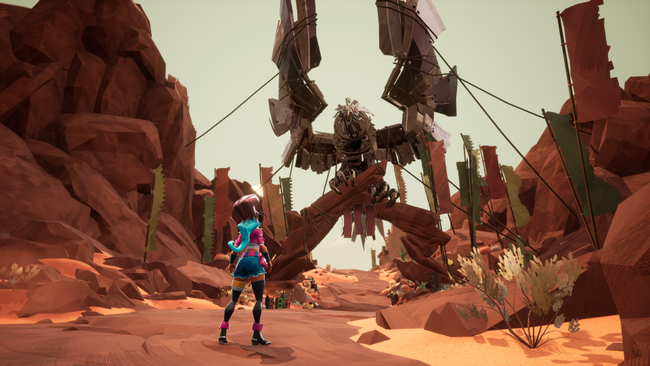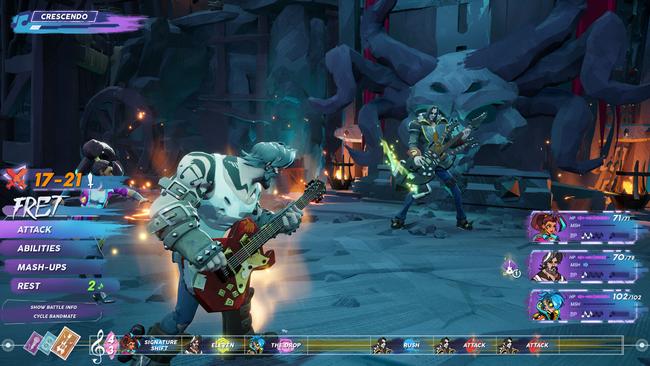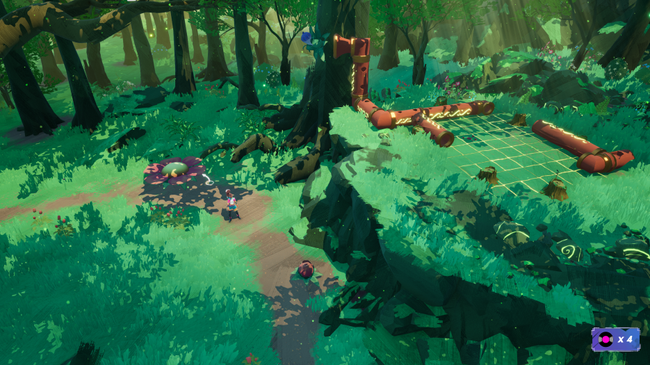
People of Note is already a delightful musical take on an RPG, and I can't wait to play more
While Tokyo Game Show is mostly a venue for games developed in Asia, that doesn't stop western publishers from showcasing projects from western teams - such as People of Note from Iridium Studios, Showcased at the Annapurna Interactive booth, this game is an RPG Musical all about musical genre mashups, wrapped up in a presentation inspired by RPGs of the past such as Chrono Trigger, Final Fantasy VII, and more.
Sitting down to play the game, a few things were made immediately clear; 1, while People of Note isn't a rhythm game, it's absolutely a game made by and for musicians. Every little element of the game revolves around musical terminology. So much so that describing the battle system can be a little tricky when so much of it revolves around terms that otherwise might not be obvious to anyone without a background in music. It's not confusing in context, it just makes describing things a little trickier.

In People of Note, you play as Cadence and her crew of musicians as they gather together the perfect band for the Noteworthy Song Contest - in the world of Note, mixing different genres of music is unheard of, and as a result Cadence's team consisting of genres like Pop, Rock and EDM has an impact on matters. During combat, turns are denoted by a time signature letting you know how many actions your party can make versus your opponent. The order of actions for each turn is denoted on the timeline below, and certain actions you take can have different effects depending on when you execute them. One of Cadence's moves is buffed if she's the first to execute an action during a turn, for instance - during the demo's boss fight, one of his actions put a modifier on the first slot of each turn, halving its effectiveness if you were to use a skill on the impacted part of the timeline.
It's hard, if not impossible, to get a feel for how the battle system will feel in the long run. Yet it feels like there's some real promise with all the intertwining systems that players have to contend with. Every so often the timeline will take on a specific color, which is your cue to prioritize skills from party members that practice that genre of music. Actions require BP, which players gain one per turn - though some Abilities allow party members to act like a battery, charging up other members of your team instead. Limit Breaks - called "Mashups" here - allow you to execute special abilities with multiple members of your team if the mashup gauge has been filled, and the other team member hasn't already moved during a turn. These also leave a lingering effect that can impact the flow of battle.

What interests me the most about the battle system isn't so much about what we saw during normal battles, but the promise of how things may unfold with the full context of character progression; per the team's creative director, Jason Wishnov, the game's combat - particularly boss fights - were designed around a sort of lock and key approach. Your team's moveset isn't actually determined by level-up, but rather you can slot in Abilities like materia into your equipment. Adding an additional wrinkle, later on in the game the game will introduce additional modifiers you can slot in to further impact the abilities at your disposal - the way it was described reminds me of Trails in the Sky, where some equipment will have these additional slots connect to only one or multiple abilities, allowing you to strategize which Abilities get which buff.
To that end, boss fights are where People of Note is meant to shine. While keeping an eye on the timeline is important, it's also a good idea to have a sense of rhythm. People of Note's abilities display themselves as a range for their effectiveness, and that comes down to how well you can time your inputs when executing them. It's not a major different, all told, but it may end up being more important than you may expect later on, considering the Crescendo system that bosses employ.

You see, the longer you're in a boss fight, they'll slowly ramp up and get stronger over time. These come in levels, so it's not immediately going to make every action stronger, but it's very clear that if you can't figure out a gameplan by the time a boss is fully powered up you may run into some trouble. I was told that combined with the system of swapping out your abilities being a core element of the game balance, they're going for a Final Fantasy XIII or Fantasian approach to boss design; there is an effective counter to each boss, and it's up to you to figure out what that is, rather than relying on the same set of skills for the entirety of the game.
I can't speak to how well things feel for the entirety of the runtime - Jason played coy, and while he couldn't officially give us an estimated length for the game, he did offer that "Chrono Trigger is a great length for an RPG" - but it's enough to get me interested to see how things shake out in the full game. I can't speak at all to the story, or even much of the dungeon designs yet, but there's something that sticks out to me here, and I look forward to seeing exactly how the full game unfolds when it launches in 2026.